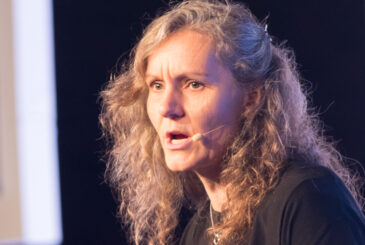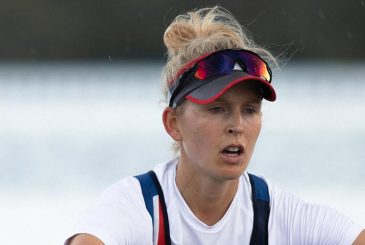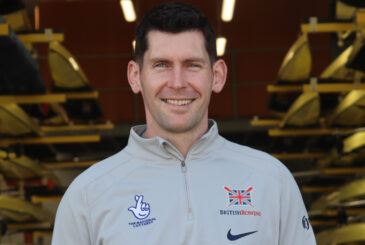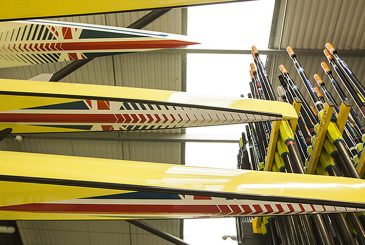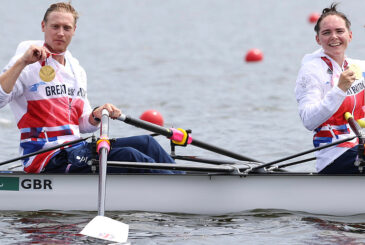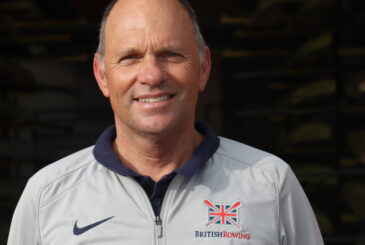The complementary skills of coaches Tom Dyson and Nick Baker are part of what makes Great Britain the team to beat at the Paralympic Games at the end of August. Martin Gough spoke to them as they made their final preparations
If you see Great Britain’s Paralympic coaches Tom Dyson and Nick Baker celebrating a little early beside Tokyo’s Sea Forest Waterway at the end of August, it may be because they have already achieved a goal by getting there, after 18 months of the COVID pandemic.
“We’ve joked with the rowers that they might not see us celebrating after the race, but they’ll see us celebrating when we push them off for the final!” says lead coach Dyson, preparing for his fourth Games with the GB team. “It’s been the hardest that I’ve done so far.
“If we put the guys on the start-line healthy, ready and they give a performance they can be proud of, that’s what we’re looking for.”
Athletes and coaches have been in a bubble since returning to training under lockdown conditions last September, at British Rowing’s training base at Caversham near Reading.
“What the guys have had to give up to allow training to happen, and keep themselves safe has been phenomenal,” says Baker. “We can’t get anywhere near COVID – it would be the end of our Games.
“Coming into these [final] camps we have stepped away from anything that isn’t rowing and home.
“We’ve moved towards getting food deliveries and not going into any stores, we look at what everyone’s partners were doing – and if they couldn’t work from home then we’ve moved people into Airbnbs to try and protect them.”
“I’m all about the fire and brimstone, the atmosphere, creating the team, while Tom is the absolute master tactician”
Sitting in one room together at Caversham – with various groups of the Olympic squad in their own bubbles in other spaces – coaches and athletes have agreed each step of the preparations together.
“What has kept us on an even keel is the openness,” says Dyson. “If someone says, ‘I really need to see a friend, I’m starting to go stir-crazy,’ the group will talk and say, ‘If you do these tests, we can support you to do that.’
“It’s had a lot of points of tension, but if people can discuss awkward things like that, talking about rowing is pretty simple.”
Baker adds: “These guys are like a group of siblings now. They really care about each other, but you spend so much time together that there’s going to be friction at points.”
And if the athletes are siblings then Dyson and Baker are perhaps mum and dad, their complementary skills making for an intriguing and lasting partnership.
Dyson is a Cambridge science graduate who got into rowing aged 15, when asked to cox his sister at Evesham RC. He joined the GB programme in the run-up to rowing’s Paralympic Games debut at Beijing 2008, for what he thought would be a year with the team, but it has so far been 14.

Baker rowed at Windsor Boys’ School and raced at three World Rowing Junior Championships from 2004-06. Still looking for direction after university he applied for a job in 2013 and has stayed in it.
“If you looked back you would see two polarised coaches,” says Baker. “I’m all about the fire and brimstone, the atmosphere, creating the team, while Tom is the absolute master tactician.”
Dyson explains: “If we ever get to tough times, we pull each other back to the centre. If I know I’ve become a boring automaton who’s just chucking information at people, I tap on Nick and say, ‘I need your help on this’.
“After eight years together we were joking that we spend more time with each other than our wives. That’s certainly going to happen over the next six weeks.”
The squad received a good luck message from the Windsor Boys’ squad during their pre-Paralympics camp.
Baker reflects: “I wasn’t the best behaved kid when I was a bit younger. When I went to Windsor Boys that was the first time I came into contact with rowing and it was the best thing that could have happened to me.
“It gave me structure, and an outlet for my energy and a sense of reward for good behaviour and good organisation. I took to it more than I’ve taken to anything in life.”
After coaching the double and single sculls to two medals at Rio in 2016, Baker now leads the mixed coxed four, who will be expected to return from Tokyo with a third successive Paralympic title.
“We’ve never sat the guys down and said, ‘We’ll expect a bronze from you and a gold from you’”
The crew is made up of Ellen Buttrick, Giedre Rakauskaite, James Fox, Ollie Stanhope and cox Erin Kennedy.
Dyson is Lead Paralympic Coach but on the water takes responsibility for the defending champion mixed double of Lauren Rowles and Laurence Whiteley and for single sculler Ben Pritchard.
Rather than talk about medal targets, though, the squad focuses on the process of hitting target times, over a course that since Rio has been extended to the full 2,000 metres.
“We’ve never sat the guys down and said, ‘We’ll expect a bronze from you and a gold from you’. We have definitely driven them very hard on what times we would expect of them,” says Dyson.
“It’s definitely more a process of producing the performance, producing the times and hopefully the medals come as a result.”
That process is arguably even more important for the coxed four, which has not been beaten in international competition since 2010.

“It’s so easy to look at the four and think they’ve been at the top for 10 years, and to just keep doing the same thing,” says Baker.
“But even as we came into this cycle, two of our returning Paralympians were overturned by new athletes coming into the system. That shows it’s stepping on every year. The numbers we’re putting out are getting faster and faster.
“That’s how we’re staying at the top. It’s not because we’re doing the same things, we’re always moving forwards. We never think, ‘Well, it’s done, we’re going to win’.”
Different challenges face a coach of Paralympic athletes – for instance injuries and illnesses are more frequent because of some of the injuries and impairments the athletes have – but what is perhaps more striking is how similar the job is to that in an Olympic squad.
“When I interviewed for the role I had no idea about Paralympic sport, but looking back it might have been one of the best things,” says Baker.
“I came into it thinking of it as high-performance rowing. It didn’t matter that they were athletes with disabilities. The behaviours, the ethos, all of the support that sits around the Olympic team would be around the Paralympic team and it would be a parallel experience.”
Standards, and the numbers involved, continue to rise in Paralympic rowing. The professional approach was unique to the GB squad for a time, but Germany, Canada and the USA all have a professional structure now.
As much as the aim is for boat speed, though, a big job for the coaches and athletes now is making this Paralympics feel as special as any other, despite what is going on around them.
“The guys are putting as much energy as possible into making this last run-in to the Games feel like it normally would,” says Baker.
“They’re trying to keep that emotional energy and excitement and trying not to get sucked in too much by the COVID restrictions.”
There are just three years until Paris 2024 but the next priority after Tokyo will be on recovering properly before building up for another Paralympics.
“Everyone across the entire Olympic and Paralympic system has to think about how they recover from this,” says Baker.
“Yes, it’s a three-year cycle, but if we all don’t decompress, breathe, reconnect with why we want to do it again and get some space with friends and family, people will fall over very early in this next cycle.”
Dyson adds: “We were on a real high after Rio, but I think it took at least two years to get back to good energy levels and get the team in the right place again.
“The priority is giving the guys a better break to come back fresh, so we don’t find ourselves in qualification year thinking, I wish we had taken longer.”
Photos: AllMarkOne



